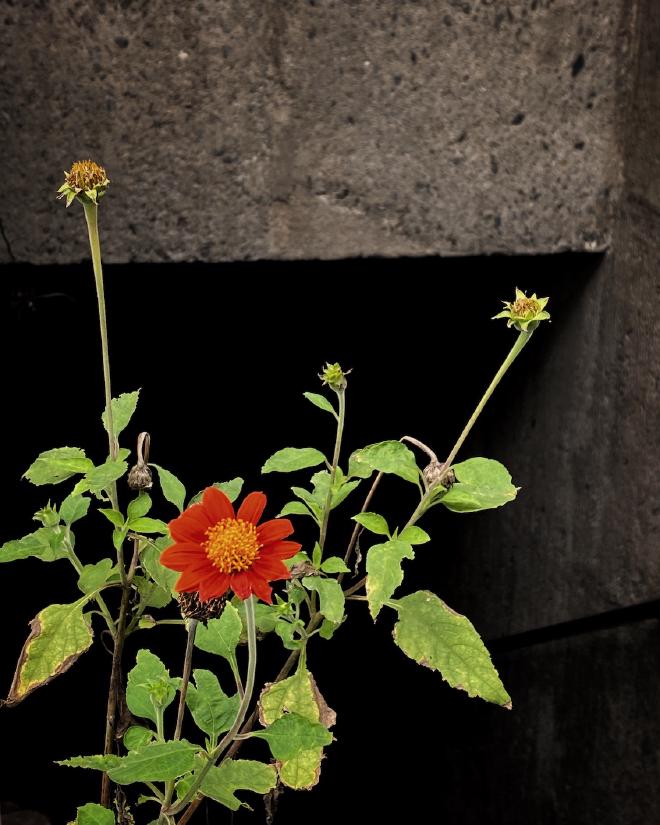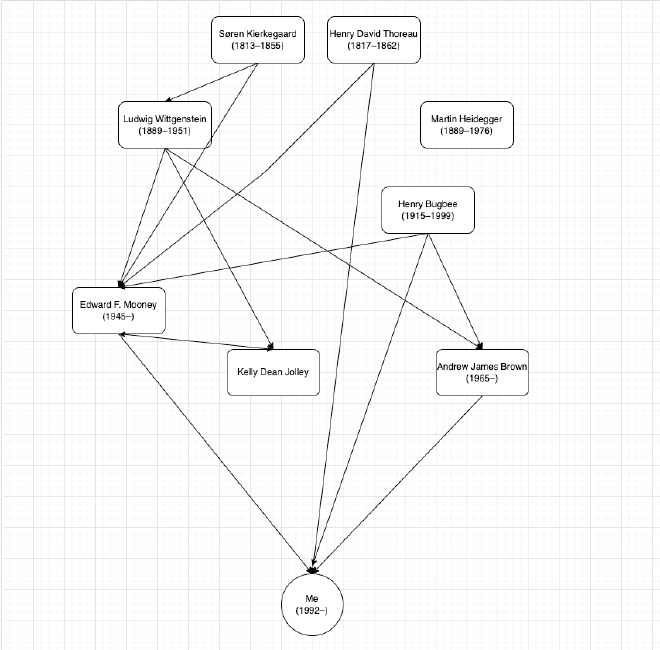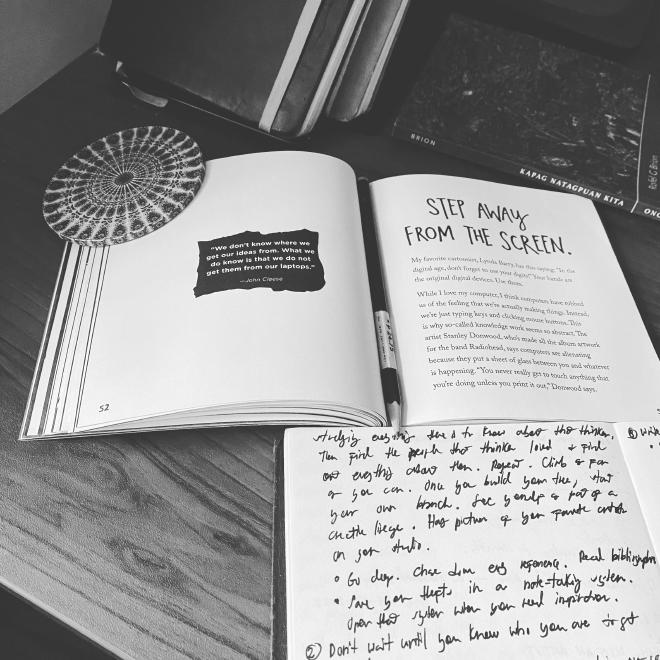A Philosophical Family Tree

Table of Contents
“In making the journey, I have no aims. These studies are intellectual footprints, not blueprints.”
“Sa paglalakbay na ito, wala akong layunin. Ang mga pag-aaral na ito ay mga bakas hindi balangkas.”
— Herbert Fingarette
Come in, come in, a fellow traveler of the web. You must be tired from all your virtual walks. Please bring your shoes in. I don’t mind. And sit here beside me. Would you like some brewed coffee? Or perhaps some sweet ternate tea?
Welcome, welcome, and thank you for coming by. It is an honor to have you here even for a few minutes—a privilege to host you on my little space on the web. Please come and take your rest.
I am Vince, and this little abode of ours is The Long Walk, a new newsletter I hope to welcome you to every Sunday from now. Since it is probably our first time to meet (or we have met long ago and forgotten each other’s stories), please allow me some introduction.
My Long Walk So Far #
I wrote a longer piece of my story on my website, so I won’t bore you with the details here. But to provide some context, here’s a brief timeline of my long walk so far.
- 1992–2011: I grew up in a small town in Pangasinan, Philippines. Raised by Jehovah’s Witnesses, I had a pretty religious upbringing. I didn’t fully embrace the faith of my parents, though, until I got into college when I became the youngest pastor (they call it “ministerial servant”) in our congregation at the age of 18. A month after I turned 19, I went through a debilitating depressive episode. I left school, went back home, and licked my wounds.
- 2012–2014: The depression crushed my entire identity and belief system. I left my childhood religion and returned to school to finish my degree. I became an atheist.
- 2015–2016: While I identified as an atheist, I never fully embraced that identity. I discovered blogging and encountered a writer who made me realize that I still resonated with what most people describe as “spiritual.” I started exploring Eastern philosophy (read the Bhagavad Gita and the Yoga Sutras of Patanjali!) and attended New Age gatherings. I still didn’t believe in “God,” but I knew I had “spiritual” sensibilities.
- 2017–present: I discovered philosophy. I dropped the New Age stuff but kept the Eastern philosophical ideas. Never wanting to go back to school, I taught myself the basics. I was first obsessed with metaphysics (what exists) and epistemology (how we know what we know), but later realized I was more interested in answering the question, “How should I live?” Around the same time, I discovered poetry, photography, and the power of walking. Plus, I was able to keep daily journaling, reading, and studying routines. So I thought, why not combine everything into a single lifelong learning project? And so, The Long Walk was born.
A Note on Format #
For now, this newsletter’s structure shall follow the rhythms of a walk. A walk leaves footprints and makes trails. Those who follow the walk must find the first footprint and begin there until the destination is reached. The tracks left allow us to “reenact” the walk. Interestingly, this is precisely what a poem or a narrative does. In a reading companion to a collection of his essays and poems, Thomas Gardner has this to say about narrative and poetry:
Wallace Stevens, in “Of Modern Poetry” (1940), defines a poem as “the mind in the act of finding / What will suffice.” This seems to me to be true of any work organized lyrically: poems, certain sorts of essays, certain sorts of fiction. We see in such work a mind moving—noting and considering, listening to what it has just said, leaping forward or turning back. Rather than reporting on what will suffice, speaking from a position of arrival, this kind of writing dramatizes the act of getting there. What we do when we read such work, as Kenneth Burke illustrates …, is reenact that movement. We perform the poem, connecting image to image or turn to turn, making of its various parts a coherent inner action: “For a poem is an act, the symbolic act of the poet who made it—an act of such a nature that, in surviving as a structure or an affect, it enables us as readers to re-enact it.”
A poem, we might say, gives us instructions for re-enacting its inner movements.
And so, through this newsletter, I will attempt to lay down the trails of my mind—some of the things I read, saw, heard, felt, or thought about in a week. I present them here as footprints, therefore, in chronological order.
Since this newsletter comes out every Sunday, the chronology happens from Monday to Saturday. I do not impose a pre-existing structure on the piece. I let the structure emerge as I look back to the week. This structure hunting happens on the day the newsletter comes out: Sunday. If the structure appears, I will be grateful. If it does not, I surrender to what is given to me. As often happens in a real walk, we cannot control what we see or find. We can only control where we put our attention into. If the essay does not look well-organized, please remember that this was by design. The goal of the newsletter is to leave footprints, not blueprints.
The purpose of The Long Walk is to invite you, dear fellow traveler, to take a peek into an intellectual and contemplative life outside the academe or a formal religious institution. But I also ask you to engage and start a conversation—you can do so in public via the comments section or in private by responding through email.
Since this is our first walk together, a preamble is necessary, making this first issue longer than I intend to be its usual length. I promise I won’t keep you this long in our next walks together.
With all that out of the way, please, I invite you to stand up and join me outside. Let us go under the trees and the warm rays of the sun for a little stroll down the trails of the previous week’s walk.
The Long Walk: October 3 to 8, 2022 #
October 3, Monday #
While exploring Substack, the platform where you are currently reading The Long Walk, I subscribed to a few other newsletters. I read one entitled Weary and Sated With Seeing: Lucretius and Us. The central thesis of the piece is that our minds are attracted to what is new rather than what truly matters. Here’s my favorite quote from the article:
No one prides themselves on knowing that the sky appears blue, but we do pride ourselves on more exotic types of knowledge.
October 4, Tuesday #
I reread Steal Like an Artist by Austin Kleon while writing notes in my journal by hand. I came to this quote at the end, which got me thinking:
“What makes us interesting isn’t just what we’ve experienced, but also what we haven’t experienced.”
I looked for an example from my life, and one thing came to mind. Growing up, I didn’t have the experience of living in a house where people asked each other what they were doing. All of us were silent types, and we did our own thing in the privacy of our rooms. What this did to me was I flourished on my own. I didn’t need much validation. Almost everything I did then (even now) was for the intrinsic reward I get from it.
In the evening, I listened to Sam Harris’ interview with the poet David Whyte on the Making Sense podcast. In the interview, Sam alluded to the assumption that meditation requires silence or the absence of words or thoughts. We both agree that it doesn’t. It is impossible to be conscious and without thoughts at the same time. As long as you are aware, you produce thoughts. Meditation is not silence or nonthinking. Meditation is simply a careful discipline of paying attention. We can do it both in silence or in the middle of a conversation, for one’s object of meditation can be anything.
October 5, Wednesday #
I did a morning walk with my partner, which I now find more regenerative than the late afternoon to early evening walks that I typically do. Now that students are back in Los Baños, the university has been filled with people in the afternoon, and my afternoon walks are beginning to lose their magic. I need to do more morning walks.
While walking, I asked my partner about that quote from Steal Like an Artist, which I mentioned above. From listening to her thoughts, I came to a new conclusion: We are hindered by our lack of experiences, and yet, like any disability, we can turn this incapacitation into something that makes us unique.
Back home, I sat down to ask myself, “How does one start living a philosophical and contemplative life?” This is a question I wanted to introduce early in this newsletter and the reason why I reread Steal Like an Artist in the first place. Kleon’s answer to art can also be adopted in philosophy: You don’t have to recreate the wheel. Thousands of ordinary people like you have attempted the same feat. Look for their examples and steal from them.
I wanted to look for heroes—mentors, alive or dead—and learn from them one by one as much as I could. I needed to create a philosophical genealogy. I began my search for heroes by returning to a kind of philosophy I encountered a few months ago: Lyric philosophy.
I read Introduction: What is Lyric Philosophy? by Warren Heiti, which talks about Jan Zwicky’s seminal book, Lyric Philosophy. I learned about the interesting design of Zwicky’s book, which she seemed to have replicated in at least one of her subsequent books. I also learned that “lyric philosophy” is a more accepted term with a decent amount of following in the academe compared to Edward Mooney’s “lyrical philosophy.” That said, both scholars find inspiration from the philosopher Ludwig Wittgenstein.

October 6, Thursday #
Jan Zwicky is part of my philosophical genealogy, but should I start my studies with her? I was not sure. I felt like she spent most of her work talking about form rather than answering the central question I wanted to contemplate: “How should I live?”
I decided to start with someone else first: Edward Mooney. I began by reading his blog, Mists on the Rivers. In his blog, Ed mentions his heroes—Thoreau, Wittgenstein, Kierkegaard, and Bashō. Thoreau was already in my family tree. I happily added the others. Ed also pointed me to two other blogs worth studying: Distinctly Praise the Years and Quantum Est In Rebus Inane, which in English means, “How much trivial stuff there is in the world!”
In the evening, I dedicated a walk to a friend who died in a terrible vehicular accident a few years back. She once studied at UPLB and, for sure, walked some of the places I frequent on campus. A poem honoring her came to me while crossing the never-ending bridge of lore. You can read that poem on the website.
October 7, Friday #
In my journal, I alluded to how translation facilitates understanding by forcing us to read something slowly. Although I love Thoreau, I find Walden, especially its first chapter, difficult to swallow. That changed when I decided to start translating it into Filipino. The translation process forces you to look at each sentence and word as closely as possible. Only then can you understand what you are reading and internalize it better because it is in your language. It doesn’t work all the time, but it will work for most of us.
Back on Edward Mooney’s blog, I read Sympathy with Intelligence, which touched me deeply. He writes so well that I started reading his latest book Living Philosophy in Kierkegaard, Melville, and Others.
October 8, Saturday #
As we often do on the weekends, my partner and I walked from our house to the School of Forestry at UPLB, a length which is enough to cover in about 45 minutes of leisurely walking. We do it in the morning right after we wake up. Upon arrival, we usually look for an empty cottage under the big trees and start meditating. This time, we tried something different. We looked for a single prompt, which each of us used to journal for one to three pages worth of writing. The prompt that came to us was the verb “articulating.” We read our essays to each other after. You can read mine on the website.
This ends our walk for this week. Thank you for joining me, and I hope to see you again next Sunday!
References #
I cultivate a forest garden of the mind, which I call my collection of notes from almost a decade of reading, writing, and contemplation. Here are the notes from where this week’s newsletter came from.
- [[Poetry and narrative trace their history so readers can re-enact them]]
- [[steal like an artist - kleon]]
- [[Meditation does not require silence or nonthinking]]
- [[lyric philosophy]]
Subscribe to my newsletter
Receive new poems, vignettes, and essays on a free, creative, inquiring, and liberative spirituality directly to your inbox. It’s free and you can unsubscribe any time.
